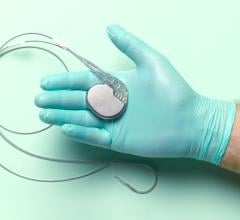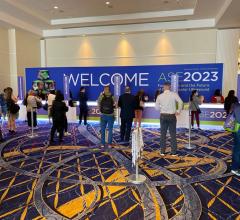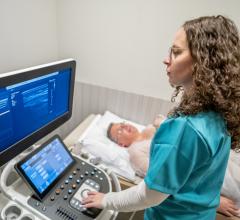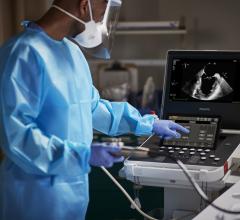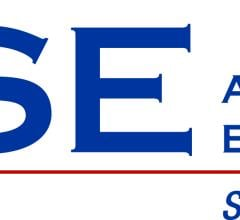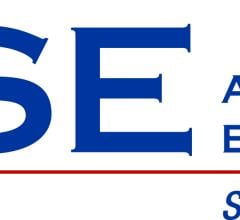
Getty Images
June 29, 2021 – A new original science category being featured at the American Society of Echocardiography (ASE) 2021 virtual meeting, June 18-21, focused on the utilization of cardiac ultrasound and the indication for echocardiography in COVID-19. Three research studies presented showed the broad scope echocardiography plays in diagnosis and ongoing evaluation and treatment of the novel virus.
Cardiovascular Biomarker Tests Can Determine if an Echo is Really Needed in a COVID Patient
Patients hospitalized with COVID-19 often have abnormal transthoracic echocardiogram (TTE) findings. However, researchers from Cedars-Sinai Medical Center in Los Angeles, Calif., recognized that not all TTE abnormalities result in changes in clinical management. They also noted performing TTEs in recently infected patients is resource intensive and increases risks of disease transmission.
“During the COVID pandemic, we evaluated the benefits of performing an echocardiographic study in relationship to the risk of exposure and transmission of disease to medical staff. While hospitalized patients with acute COVID-19 pneumonia may have abnormal echocardiographic findings, not all of these findings lead to changes in clinical management," explained Stephanie Wu, M.D., lead author on the study Determining Which Hospitalized COVID-19 Patients Require an Urgent Echocardiogram. "We found that the combination of normal cardiovascular biomarkers, substances that are released into the blood when the heart is damaged or stressed, like troponin and B-type natriuretic peptide levels, was an effective screening method to determine in which patients’ echocardiograms could be safely delayed until after their most infectious window has passed. This simple screening method reduced the risk of exposure to staff without compromising patient care.”
Contrast Helps Speed Echo Exams in COVID Patients
The second COVID-19 presentation being featured focuses on the use ultrasound enhancing agents (UEAs or contrast echocardiography) in COVID-19 patients. The use of UEAs does not expose patients to radiation and also saves significant exposure time for those performing TTEs in hospitalized COVID-19 patients.
Dylan Sperling, M.D., a second-year internal medicine resident at the Icahn School of Medicine at Mount Sinai, was the lead author on Significant Diagnostic Impact of Ultrasound Enhancing Agents on the Performance of Transthoracic Echocardiograms in COVID-19 Patients. He said, "Hospitalized patients with COVID-19 infection present a diagnostic challenge for cardiac ultrasound (TTE) due to significant lung and/or heart problems. Additionally, because of potential contagion, healthcare personnel performing TTEs should limit their exposure as much as possible to these patients."
Sperling said a previous study they did found performance of TTE with UEAs took significantly less time when compared to unenhanced imaging in patients hospitalized with COVID-19. This current study of the same population found that administration of UEAs provided new, clinically diagnostic information in 45 percent of patients.
"These were findings that were not visualized on unenhanced imaging," Sperling said. "This was particularly evident in those with severe lung disease. Our findings support the expedited use of UEAs with TTE in hospitalized COVID-19 patients to improve diagnostic yield and limit the exposure of sonographers and physicians performing the exam.”
Left Atrium Has Severely Abnormal Function in COVID-19 Patients
The final research study being highlighted focuses on the various cardiovascular events resulting from COVID-19 including atrial fibrillation/flutter. Patients with atrial fibrillation/flutter are at significantly increased risk of stroke, heart failure, and death. Researchers at Johns Hopkins University aimed to compare echocardiographic measures of the function of the left atrium, an important filling chamber of the heart, between hospitalized COVID-19 patients and COVID-negative patients with critical illness or respiratory disease.
“We found that on echocardiogram, the left atrium of the heart had severely abnormal heart function in COVID-19 patients," explained Erin Goerlich, M.D., lead author on the study Impaired Left Atrial Function in Patients with COVID-19 and its Association with Atrial Arrhythmias. "This abnormality was even worse in COVID-19 patients who went on to develop an abnormal heart rhythm, specifically, atrial fibrillation or atrial flutter, while in the hospital. This is an important finding because an abnormal left atrial strain value on echocardiogram may be a helpful clue in determining which patients are at highest risk for atrial fibrillation and atrial flutter."
She said finding abnormal left atrial function in a COVID-19 patient may be a reason to start blood thinners to reduce this risk. It would also suggest that COVID-19 survivors should pay close attention to their heart rates and symptoms after hospital discharge.
"Anyone currently infected with or recovered from COVID-19 should alert their physician to any abnormally fast heart rates or palpitations, as this could lead to further important cardiac testing and treatment,” Goerlich said.
These posters will be presented as a part of the ASE 2021 Scientific Sessions online.
For more information: ASEcho.org

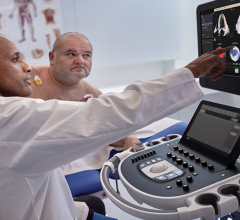
 June 12, 2024
June 12, 2024 

